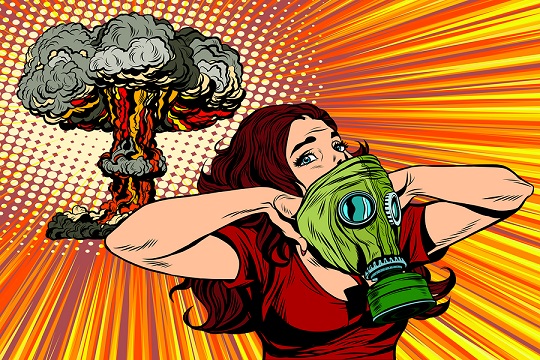 "I’m not what you would call a “praying” person, but I have begun to pray. - Madelon Sprengnether
"I’m not what you would call a “praying” person, but I have begun to pray. - Madelon Sprengnether
The fear of nuclear war is back. The results of a study by Chapman University in Orange, California recently revealed 48.4 percent of people surveyed said they are ‘afraid’ or ‘very afraid’ a third world war will occur in their lifetime, ranking it seventh on the 2017 American top ten list of fears.
“Thirty minutes,” writer Mark Bowden noted in The Atlantic’s recent July/August issue. “That’s about how long it would take a nuclear-tipped intercontinental ballistic missile launched from North Korea to reach Los Angeles.”
In early August, President Donald Trump vowed North Korea's continued threats would be “met with fire and fury and, frankly, power, the likes of which this world has never seen before.”
And less than 24 hours ago, a senior North Korean official issued a firm warning to the world that it should take "literally" the country’s threat to test a nuclear weapon above ground.
Worried yet? Nervous? Experiencing any other symptoms typical of anxiety? You’re not alone.
Not only is an entire generation—the generation of Baby Boomers—reliving as adults the fear of nuclear war they experienced as children in the late 1950s, ‘60s and ‘70s, but an entirely new generation of children is now getting to live it first-hand.
But how does one calm a child’s fears when nuclear war--and the world’s fate or future--continue to be hot topics around office water coolers, on television and across social media. Try typing #nuclear war on Twitter and read a few of the anxiety-ridden tweets posted just today. On October 26, @Sebastianbach tweeted: “[sic] What do u tell your 10 yr old when they say w tears in their [eyes] ‘Daddy Im scared we’re gonna have a nuclear war?’ I don’t know what to say.”
In a recent commentary written for the Los Angeles Times, Susan Linn, a psychologist and a lecturer on psychiatry at Harvard Medical School, summarized the effects of nuclear war anxiety on today’s children and youth.
According to Linn, the 1980s saw a flurry of medical, psychological and educational analyses that reported on the effects fear of nuclear war had on children of that generation. Scientists and scholars found nuclear anxiety started in early childhood but grew and developed throughout adolescence. Researchers found that for children in the United States, only their fear of the death of one or both parents surpassed the concern over nuclear war. Interestingly, Linn writes that those rankings were reversed in the Soviet Union.
A child of the ‘50s and ‘60s herself, Linn recalls “mushroom-cloud nightmares and daytime terror, inspired by the news we watched on our three channels of black-and-white television.”
Today, in a world where smartphones, tablets and other digital devices make it impossible to escape the news, Linn says children are even more exposed to “the media’s take on world events”.
The result for children, according to Linn is: “They’re going to need our help.”
Like Linn, Madelon Sprengnether, whose quote appears above, remembers her overriding anxiety as a child growing up in St. Louis right in the midst of the United States’ Cold War arms race with the Soviet Union. “I’ve managed this fear . . . but have never been entirely free of this anxiety,” writes Sprengnether.
And still the question looms—how does one calm the fears of children when the world is unsure of its own future?
“What should we do?” asks Linn in her article. Her answer is simple. "It might be easier to say what we shouldn’t do. Namely, we shouldn’t adopt the 1950s model for coping — we shouldn’t deny that there is potential for devastation or feed children the myth that they can protect themselves from a nuclear strike."
Linn maligns the mixed prescription for nuclear war survival conferred on the children of her generation—practicing survival duck-and-cover drills under their school desks while nightly news showed images of post-nuclear bomb survival planned in underground shelters outfitted with canned food.
Instead of providing these same kinds of mixed messages she recalls from her childhood, Linn suggests assailing children’s fears by tempering the reality that nuclear war could happen with the honest probability that its occurrence is unlikely.
“We can tell them that, like us, most people don’t want [nuclear war] to happen,” writes Linn. “And we can reassure them that people in our government and in other governments around the world are working hard to prevent it.”
Finally, Linn suggests reassuring children and youth that they are never alone. Children should be encouraged to share their concerns with parents and other adults they trust. “[The] combination of fear, helplessness and isolation can lead to despair, apathy, cynicism or alienation — destructive attributes in individuals,” she explains.
The best way to calm the fear and resulting anxiety is to show children how much adults care about them and about the world. Action will help reduce anxiety and Linn suggests the best way is “to face the terror of nuclear war and do everything we can to prevent it.”
References
Linn, S., (September 26, 2017). Commentary: How do we help children cope with fear of nuclear war? For the Los Angeles Times. http://www.chicagotribune.com/news/opinion/commentary/ct-children-fear-nuclear-war-20170926-story.html
Meyer, R., (August 12, 2017). Nuclear Anxiety Returns to America. The Atlantic. https://www.theatlantic.com/business/archive/2017/08/nuclear-anxiety-returns-to-america/536640/
Sprengnether, M., (Posted September 26, 2017). Psychology Today. Who’s Afraid of Nuclear War? I am. https://www.psychologytoday.com/blog/minding-memory/201709/who-s-afraid-nuclear-war
The Canadian Press (August 11, 2017). Trump-induced fear of nuclear war a normal reaction, psychologists say. http://www.cbc.ca/news/world/nuclear-war-anxiety-1.4242884
Visser, N., (October 16, 2017). North Korea Says Nuclear War 'May Break Out Any Moment'. HuffPost. http://www.huffingtonpost.ca/entry/north-korea-nuclear-war-ambassador_us_59e55925e4b0a2324d1d20cc